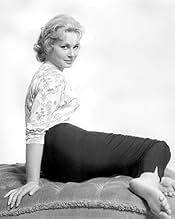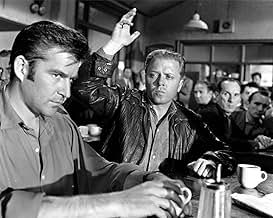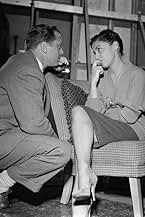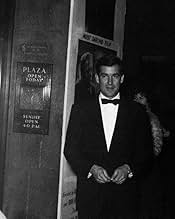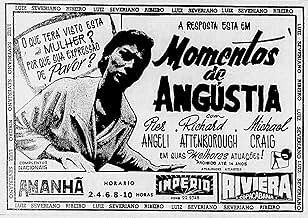NOTE IMDb
7,2/10
1,8 k
MA NOTE
Ajouter une intrigue dans votre langueA young factory worker decides to stand up against his workmates and fellow union members when they want to hold a wildcat strike.A young factory worker decides to stand up against his workmates and fellow union members when they want to hold a wildcat strike.A young factory worker decides to stand up against his workmates and fellow union members when they want to hold a wildcat strike.
- Réalisation
- Scénario
- Casting principal
- Nommé pour 1 Oscar
- 6 victoires et 6 nominations au total
Avis à la une
Filmed in Ipswich, this screenplay, challenging in its time, gives a clear portrayal of British Industrial relations during the time 'We never had it so good.' Alfred Burke's agent provocateur with his sinister telephone calls does just enough to suggest that the cold war was blowing through British engineering. Attenborough's innocent at the power lathe is nicely offset by the underrated Michael Craig as his friend and lodger forced to go along with the Union's decision to send the strikebreaker to Coventry. Good location shooting and the knowledge that things were not so very different in reality makes this a handy movie from several perspectives. Viewed with 'I'm Alright Jack' you can gain a fair impression of Britain in the days of Black and White Television
This brilliant, deeply contentious film has largely been ignored over the years. It came out just as 'the kitchen sink' was kicking in and, although dealing with the working class, was very much an establishment film. It's right-wing and anti-Union and it quickly became very unfashionable to think highly of it. But dramatically, it's first-rate; it has the feel of those good BBC 'Plays for today' that came out in the sixties even if does leave a very bad taste in the mouth.
It's about a man sent to coventry for not supporting an unofficial strike. He's played by Richard Attenborough and it's a great piece of acting. As written, the character isn't developed in dramatic terms but Attenborough is wonderfully naturalistic. It's an intuitive performance; he gets inside the character's skin and thought processes. He's very moving.
There is very fine work, too, from Pier Angeli as his Italian wife. (Angeli was probably brought in to sell the film in America, and there's an easy-going, unforced quality to her acting that is very 'un-British'). And Bernard Lee is excellent as the dictatorial shop steward. The film also has an unfortunate Mephistopolean character in the form of an infiltrator. He's evil and cowardly and used in such a blatantly metaphorical way you can't be sure exactly what his purpose is. And being a political, Union bashing film you may feel uneasy watching it. But there are very fine. sustained dramatic sequences, too and it is utterly unsentimental.
It's about a man sent to coventry for not supporting an unofficial strike. He's played by Richard Attenborough and it's a great piece of acting. As written, the character isn't developed in dramatic terms but Attenborough is wonderfully naturalistic. It's an intuitive performance; he gets inside the character's skin and thought processes. He's very moving.
There is very fine work, too, from Pier Angeli as his Italian wife. (Angeli was probably brought in to sell the film in America, and there's an easy-going, unforced quality to her acting that is very 'un-British'). And Bernard Lee is excellent as the dictatorial shop steward. The film also has an unfortunate Mephistopolean character in the form of an infiltrator. He's evil and cowardly and used in such a blatantly metaphorical way you can't be sure exactly what his purpose is. And being a political, Union bashing film you may feel uneasy watching it. But there are very fine. sustained dramatic sequences, too and it is utterly unsentimental.
How did I never see this? Another Talking Pictures TV gem. Preceded the year before by the excellent and similarly themed comedic classic, I'm Alright Jack, this hard-hitting drama is an ideal counterpart. A strong cast, headed by Richard Attenborough, with his wife very well played by Pier Angeli. I particularly liked Alfred Burke's scheming, Marxist, union activist, book-ending the film with his arrival and departure - on public transport, of course. It also features Bond regulars, Bernard Lee and Geoffrey Keen, an early role for Oliver Reed, and playing himself, Alan Whicker. It's not quite Kitchen Sink, which had more of a fashionable, if usually grim theme, but is in a similar vein.
Ignore comments about it being 'far-right', they are ridiculous. The film is a well-balanced, politically centrist take that in no way demonises unions or strikes, although occasionally feels a bit heavy handed with some of its messages. Clearly, pre-1970s, there was still a battle going on for the hearts and minds of the working class. A prophetic warning of the far-left politics that was to come over the next decade. By the time 1971's very silly and misjudged, but better known, Carry On At Your Convenience arrived, the battle was lost. Beyond politics, this is essentially a universal story about bullying, group think and the individual, and reminded me a lot of my school days. It deserves to be better recognised and watched.
Ignore comments about it being 'far-right', they are ridiculous. The film is a well-balanced, politically centrist take that in no way demonises unions or strikes, although occasionally feels a bit heavy handed with some of its messages. Clearly, pre-1970s, there was still a battle going on for the hearts and minds of the working class. A prophetic warning of the far-left politics that was to come over the next decade. By the time 1971's very silly and misjudged, but better known, Carry On At Your Convenience arrived, the battle was lost. Beyond politics, this is essentially a universal story about bullying, group think and the individual, and reminded me a lot of my school days. It deserves to be better recognised and watched.
I saw this film in my first year in law school in New York in 1991. A prior comment calls the film "right wing." Unfortunately, given the subsequent events in Britain in the 1970s and contemporary events in Detroit right now, it is prescient. Lord Attenborough's character faces a labor high noon many encounter in a union shop. One older worker in the film wants only to make a product that he is proud of. A pride that forces in the union movement obstruct. Anyone compelled to join a union by organizers who hire on only to unionize, will appreciate this film. I know. I've been there -- twice. White collar and blue collar jobs. That the film was made at all is amazing. But this often grim picture does have a comedic sibling -- the equally brilliant I'M ALL RIGHT JACK with Ian Carmichael and Peter Sellars. See both and you will understand what happened to Britain as well as too much of industrial America. If corporate greed has a partner, it is union executives who throw their members under a bus to save their jobs. THE ANGRY SILENCE should be required viewing for anyone who believes that political films -- not politicized films -- have a place in Hollywood. Heartbreaking story, economic direction, and brilliant acting. In dramatic black and white. The screenplay won a BAFTA Award for Bryan Forbes.
to anyone who lived through these times and these types of factory settings this film resonates.
The Burke character of the communist agitator invokes criticism of left bashing but anyone who had experience of the British motor/engineering industry in these times knows that it is much closer to the truth than many people want to believe.
However to those that think the film has right wing bias you only have to look at how the useless fat cat directors are portrayed (having no knowledge of the business they are taking large salaries from), hardly an advertisement of capitalism. Plus even the "sympathetic" management end up not supporting the worker who supported them, as bad as the agitator in their own way.
Good performances all round, outstanding from Richard Attenborough, Pier Angeli, an unusually good turn by Michael Craig and dependable Bernard Lee as the dim union man manipulated easily by the agitator.
A style of film-making gone now but interesting social commentary of the times. Recommended for social historians and affectionados of good acting.
The Burke character of the communist agitator invokes criticism of left bashing but anyone who had experience of the British motor/engineering industry in these times knows that it is much closer to the truth than many people want to believe.
However to those that think the film has right wing bias you only have to look at how the useless fat cat directors are portrayed (having no knowledge of the business they are taking large salaries from), hardly an advertisement of capitalism. Plus even the "sympathetic" management end up not supporting the worker who supported them, as bad as the agitator in their own way.
Good performances all round, outstanding from Richard Attenborough, Pier Angeli, an unusually good turn by Michael Craig and dependable Bernard Lee as the dim union man manipulated easily by the agitator.
A style of film-making gone now but interesting social commentary of the times. Recommended for social historians and affectionados of good acting.
Le saviez-vous
- AnecdotesThis movie was initially banned in certain parts of Wales, as several cinemas were controlled by the miners' unions at that time. It was only when Richard Attenborough personally intervened and screened it for the union leaders that the ban was revoked.
- GaffesThe girl lying on the grass with the motorcyclist is flat on her back on the grass then the shot changes and she has her head raised with her head using a tree trunk as a pillow.
- Citations
Tom Curtis: Shut up! Shut up will you! You don't have to worry about not talking to me. I don't want you to talk to me, do you hear? But you stay away from my family. Just stay away from us!
- ConnexionsFeatured in Film Review: Richard Attenborough (1968)
Meilleurs choix
Connectez-vous pour évaluer et suivre la liste de favoris afin de recevoir des recommandations personnalisées
- How long is The Angry Silence?Alimenté par Alexa
Détails
Box-office
- Budget
- 98 000 £GB (estimé)
- Durée1 heure 35 minutes
- Couleur
- Rapport de forme
- 1.66 : 1
Contribuer à cette page
Suggérer une modification ou ajouter du contenu manquant

Lacune principale
By what name was Le silence de la colère (1960) officially released in India in English?
Répondre



